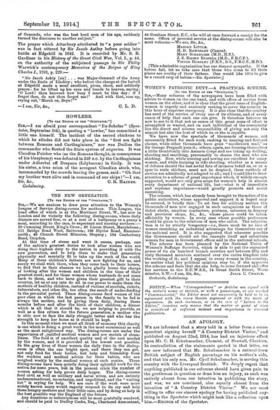WOMEN ' S PATRIOTIC DIITY.—A PRACTICAL SCHEME. ITo THE EDITOR OF sax
"srzerAves."1 SIR, Many columns of the newspapers have been filled with advice to women on the one hand, and with offers of service from women on the other, and it is clear that the great mass of English- women is eagerly and anxiously seeking to serve the country in this hour of supreme emergency. It is also clear that the country has need of the service of every one of its citizens, and of every ounce of help that each one can give. It therefore behoves us now to see to it that not an ounce of this great mass of effort is misapplied or wasted, and on each individual of the community lies the direct and solemn responsibility of giving not only the utmost but also the best of which he or she is capable.
We have now the spectacle of thousands of women, not necessarily fitted for such work, rushing to nursing and first-aid classes, while other thousands have gone "needlework mad," as Sir George Pragnell puts it ; others, again, are forming themselves a little theatrically into Amazon Corps and are taking up drilling, shooting and marching, presumably to shame the men who are shirking. Now, while nursing and sewing are excellent for many women, and while training in rifle shooting, whether as a means of defence should the last awful fate of invasion befall us, or as a spur to male shirkers, must not be despised, these methods of service are admittedly not adapted to all; and I would like to draw attention to a scheme of great importance which, if widely enough supported, would not only give scope for women's help in almost every department of national life, but—what is of immediate and supreme importance—would greatly promote and assist recruiting.
The scheme, which has already been brought to the notice of the public authorities, whose approval and support it is hoped may be secured, is briefly this : To set free for military service the thousands of men now engaged in such occupations as those of ticket clerks, omnibus conductors, postmen, salesmen in drapery and provision shops, &c., &c., whose places could be taken efficiently by women. In every case where possible preference would be given to the relatives of men who enlist. The substitu- tion is to be strictly temporary—i.e., there must be no idea of women snatching an industrial advantage for themselves out of the national need. It is also suggested that wherever possible the Government should set the example itself and substitute women for men in Government offices and in the national schools.
The scheme has been planned by the National Union of Women's Suffrage Societies, which is able to put the organized power of its six hundred branch societies and between fifty and sixty thousand members scattered over the entire kingdom into the working of it; and I appeal to every woman in the country, no matter what her political opinions may be, if she approves the scheme and feels that she can help, to come forward and offer her services to the N.U.W.S.S., 14 Great Smith Street, West-


































 Previous page
Previous page